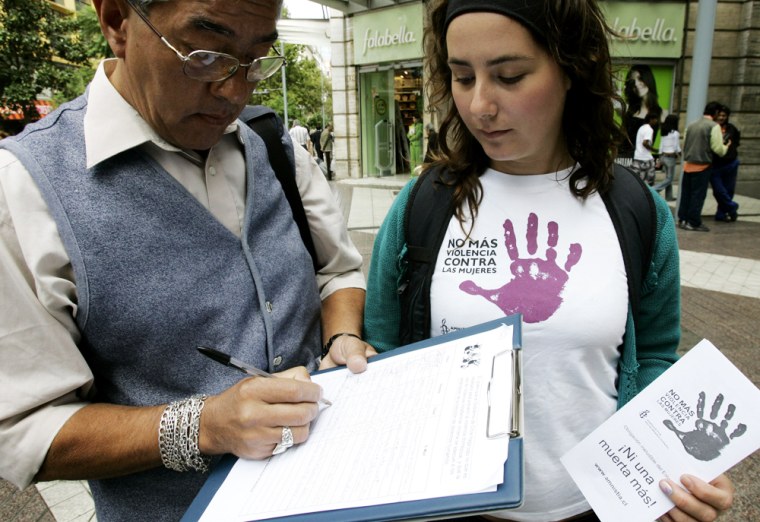Chile’s first female president celebrated International Women’s Day Thursday by assuring that politics has changed for good as she nears the one-year mark of a term that has brought new opportunities for her countrywomen.
Leaders will find it hard to “go back to the days when the top jobs were filled with dark suits and neckties,” said in a speech.
“Women came to Chilean politics to stay,” she added. “We want a society that includes everybody, where opportunities reach all its daughters and sons.”
The January 2006 election of Socialist Michelle Bachelet, a separated mother of three, gave women across Latin America cause for hope that the region’s macho ways were changing.
“Chile is no longer our fatherland—it’s our motherland” became a popular refrain.
A physician, Bachelet embraced gender issues from the start, vowing that her government “will fight with all its capacity for the full exercise of women’s rights.”
Among its accomplishments:
- A law gave women the right to breast-feed at work.
- A law stiffened the penalties for men who fail to pay alimony.
- Hundreds of nurseries have been established nationwide, along with domestic violence shelters for women and children.
- Equal numbers of women and men are now serving in top government jobs, including her Cabinet.
- Women were for the first time admitted at the naval academy.
But there’s also been resistance in a socially conservative nation that only recently legalized divorce.
Conservatives and the Roman Catholic Church fought, ultimately unsuccessfully, to block Bachelet’s program offering free morning-after contraceptive pills to girls as young as 14. Chile still prohibits abortion in all cases.
And other issues have dragged down her popularity, among them chaotic student protests last year and a new public transportation system that left many commuters stranded in the capital.
Positive public opinion
Two opinion polls this week showed less than half of Chileans were happy with her performance as president.
Even some allies have complained about the government’s inability to solve disputes within its own coalition. “The government has to decide whether it will act or just watch our internal problems,” said Socialist Sen. Alejandro Navarro.
Women’s Affairs Minister Laura Albornoz told The Associated Press that Bachelet seeks to permanently women’s standing. “What we want is to establish policies that will remain after Bachelet leaves the presidency,” she said.
Albornoz acknowledged that women still have a long way to go to escape domestic violence and discrimination at work.
‘If you’re pregnant, goodbye!’
Lydia Alvarez, who works at homes for the elderly, said she has been turned down twice for jobs because she refused to submit to an illegal—but common—pregnancy test.
“They tell you they are not supposed to ask for the test, but they do anyway,” Alvarez said. “If you’re pregnant, goodbye!”
Women’s groups are trying to reform Chile’s law against domestic violence, which defines abuse as repeated and habitual. Activist Soledad Granados estimated that the average domestic violence case takes seven years to reach a court.
Women’s salaries remain as much as 33 percent lower than those of men for the same work, according to the International Labor Organization, and just 37.5 percent of Chilean women are in the work force, compared with 47 percent for Latin America.
Women still lag far behind men in politics, too. While they account for 52.5 percent of Chile’s 8 million registered voters, they hold only 12 percent of seats in Congress.
Bachelet is preparing a bill that would force political parties to reserve for women 30 percent of their candidacies in congressional and municipal elections.
